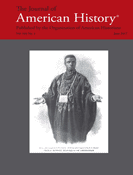-
Views
-
Cite
Cite
Edward P. Kohn, Your Country, My Country A: Unified History of the United States and Canada, Journal of American History, Volume 104, Issue 1, June 2017, Pages 162–163, https://doi.org/10.1093/jahist/jax011
Close - Share Icon Share
Extract
In January 1942 Canadian prime minister William Lyon Mackenzie King issued orders for the removal of all persons of Japanese origin from a designated protected area one hundred miles inland from the British Columbia coast. Those removed were sent to internment camps in Alberta. Significantly, U.S. president Franklin D. Roosevelt issued his infamous Executive Order 9066 on February 19, 1942—after the Canadian orders. This was a moment that reflects the promise of Robert Bothwell's Your Country, My Country.
Unfortunately, Japanese internment is not mentioned in the book. Rather than a true “unified history of the United States and Canada,” Bothwell has produced a straightforward, well-written survey of Canadian-American relations since the eighteenth century. From the first sentence Bothwell makes clear that the volume will address relations between Canada and the United States; indeed, the phrase “Canadian-American relations” appears three times on the first page. Along the way, however, are also promises to address “comparisons of Canadian-American values, and discussions of Canadian-American differences,” but such references are spotty (p. 3). In the last chapter, “Back to the Future?,” Bothwell attempts to assess Canadian and American similarities and differences in the twenty-first century, but inevitably he comes back to Canadian-American relations. In the free-flowing conclusion to the book Bothwell contemplates points of convergence and divergence between the two countries, coming to the predictable conclusion that both countries have some transnational characteristics yet remain unique sovereign entities.





